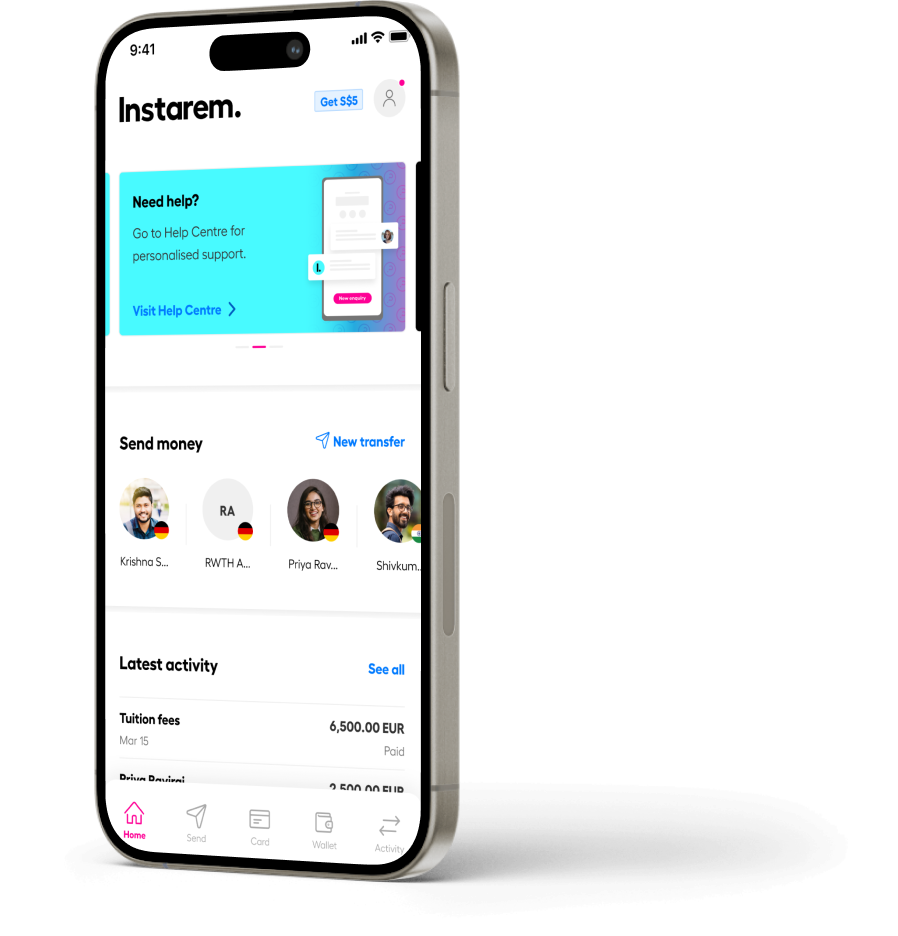5 questions to ask yourself before pursuing an overseas degree

This article covers:
Getting a degree these days is quite the adventure, isn’t it? With all the options available, it’s like choosing from a buffet of knowledge! Especially here in Asia, education is seen as a real game-changer, a passport to success.
But hey, let’s be real. The pressure is on, right? Your family, your future—everyone’s counting on you to make the most of your education. The last thing you want is to look back and wonder if all those late-night study sessions were worth it.
But wait, why risk all that effort? Picture this: investing tons of time and money into a degree that ends up being more like a fancy diploma than a career key.
So, before you take the plunge, there are some important questions you might want to ask yourself before diving into an overseas degree.
Is your degree valid in your home country?
So, let’s start with the big question: Is your degree from abroad actually recognised back home?
Now, you’d think it’s a slam dunk if you score a spot at Ivy League gems like Yale, Brown, or Harvard, or the prestigious UK universities like UCL, LSE, or Oxbridge. I mean, those are the cream of the crop, right? No one’s going to second-guess their rep.
But let’s be real here. Not all of us are geniuses who can crack into those top-tier schools worldwide. For most of us, it’s about aiming for something a tad more within reach.
But hey, don’t let desperation cloud your judgment. And here’s the thing about professional degrees like medicine, nursing, or law from overseas: Your country might have strict criteria for recognising them. If your degree doesn’t meet those standards, tough luck.
Still not getting it? Let me break it down for you: While math might be the same everywhere, accounting rules and standards aren’t.
So, here’s the kicker: You could end up with a degree that’s not worth squat back home, leaving you to jump through even more hoops, spend more time, or shell out more cash to get your skills recognised.
You might think, “Hey, I’m not planning to dive into accounting or medicine, so accreditation doesn’t really matter to me.”
But hold up, there’s more to it than just specific fields. The quality of your education and international standards play a big role too. Are your countries part of a global agreement that gives your degree some street cred?
This is basically your stamp of approval that says, “Hey, this education is top-notch.”
That’s why you’ll find some online degrees or foreign certificates not making the cut. They just don’t meet the mark when it comes to quality.
So, if your school’s got the seal of approval, a solid rep worldwide, and a touch of prestige, chances are your home country’s government and employers will give your degree the nod.
So basically, these are the spots you want to check out to make sure everything’s legit:
- Accreditation: Is the school you’re eyeing up accredited by an international or local agency?
- Quality: Is this place known for top-notch education, both here and abroad?
- Recognition & Qualifications: Will your degree be respected back home? Is it on par with domestic degrees?
- Authenticity: How legit is the school? A long history usually means fewer headaches down the road.
- Reciprocity: Does your school have a deal with one back home to validate degrees?
- Accords: Are your countries part of any agreements that make your degree legit across borders?
- Credits Transfer: If you have to bail on your degree early, can you take those credits with you back home? Or are you starting from square one?
Do you want to work abroad?
So, here’s the thing: Do you have your sights set on working abroad? Cause here’s the deal – degrees and certificates might not always translate across borders. And if you’re already studying overseas, it might be worth sticking around instead of heading home.
But it’s not just about skills and recognition. You’ve also got to consider the connections you’ve made. Those personal and professional networks? Yeah, they might not follow you back to your home turf.
Oh, and get this – some countries let you switch from a student visa to a work visa once you’re done with school or start job hunting. So, you could have a leg up when it comes to landing a gig, especially compared to someone from overseas trying to break into the same job market.
What are the industry realities? What are your job prospects?
Now, not everyone’s out here chasing those hefty pay checks. Some of us are in it for the sheer love of learning. But let’s face it, if your degree can’t open doors to a job after all those years of studying, then what’s the deal, right? Passion’s awesome, but it’s gotta pay the bills too. Sure, diving into philosophy sounds cool, but landing a full-time gig as a philosopher right off the bat? Maybe not so much.
And let’s not ignore the elephant in the room – with AI taking over, a bunch of jobs are becoming obsolete. So, does your job exist after you graduate?
And speaking of jobs, don’t forget about industry preferences. Even if your degree looks good on paper, it still impacts your job hunt back home. Some hiring managers back home have a thing for candidates from specific countries or fancy-pants universities.
Take STEM degrees from top US universities, for example. They could seriously up your chances back home. But remember, the pay check might not be as fat as what you’d rake in stateside. Still, getting some foreign work experience under your belt could sweeten the pot.
Here’s the flip side though: Having a foreign degree might not always give you the upper hand, especially in cutthroat industries flooded with similarly qualified candidates. Unless it’s from a top-tier school, your international diploma might not make much of a splash.
Oh, and here’s a reality check – acing all your exams doesn’t guarantee you a job. Employers, whether back home or abroad, are looking at a whole package deal – skills, experience, attitude, and even your network.
So, before you jet off on that study abroad adventure, take a good hard look at these realities. Do your homework, manage those expectations, stay open to opportunities, and brush up on any skills you might be lacking.
What does your financial future look like?
At every stage of life, big events like childbirth, weddings, and funerals can put a dent in your wallet. And hey, you don’t want to be buried under a mountain of debt till death do you part. Same goes for studying abroad.
Before you pack your bags, take a hard look at your finances. Can you foot the bill for studying overseas? And once you’re there, how are you going to manage your day-to-day expenses?
If you’re not exactly rolling in dough, explore your options. Are there scholarships, loans, or grants up for grabs? Maybe you can lean on friends, your employer, or even dear old mom and dad for a little financial boost.
If you do need to borrow, suss out the nitty-gritty. What’s the interest rate on that loan? Are there any special deals you might qualify for? And do you need to put up any collateral?
And here’s the million-dollar question: Can you comfortably pay back that loan without tanking your finances? If not, how do you plan to tackle your debt? Are your job prospects solid enough to keep you afloat? And do you have any other income streams to tap into?
Bottom line: Before you jet off, make sure you’ve got answers to these questions. After all, you don’t want to land in a foreign land drowning in debt, do you?
Does your life line up with your study abroad dreams?
Sure, money problems can be a headache, but it’s the ones money can’t fix that really throw us for a loop.
Especially for us Asians, family ties and values run deep. So, deciding to study abroad can be a real shocker for both you and your folks.
Consider these areas:
- Commitments: How will your family cope with your journey overseas? If you have elderly parents, how will they manage without you? Will your spouse work while you study? And if you have kids, what’s the plan for their schooling and care?
- Costs: If you’re ditching a job or business to study abroad, think about how it’ll affect your wallet and career. Can you afford to lose that income? And even if you snag a part-time gig overseas, will it cover all your expenses?
- Culture Shock: Even if you’re familiar with the language and culture, brace yourself for some culture shock. And when you return home, be prepared for a dose of reverse culture shock. It might take some time to adjust back to the way things were.
Let’s be realistic…
Studying abroad sounds like the adventure of a lifetime, promising tons of intellectual growth and personal fulfilment. But let’s get real for a sec – it’s not always as easy as it sounds.
So, before you dive into the overseas education whirlwind, take a step back and think it through. Keep an open mind, and consider all the angles.
Before you go…
Heading off on the adventure of studying abroad or seeing your child off on this thrilling journey is a rollercoaster of emotions. It’s exciting, sure, but it can also be overwhelming, especially when it comes to sorting out all the little details.
One crucial detail you don’t want to overlook is how to handle overseas money transfers. With so many options out there, finding a trustworthy partner with great rates can feel like searching for a needle in a haystack.
That’s where Instarem comes in to save the day. We’re here to make international money transfers a breeze, offering low fees and competitive exchange rates you can rely on.

With Instarem by your side, you can send money to over 60 countries worldwide hassle-free. Our user-friendly platform makes transferring funds as easy as pie, and our app lets you track your transactions every step of the way, giving you peace of mind throughout the process.
Try Instarem for your next transfer by downloading the app or sign up here.
*Disclaimer: This article is intended for informational purposes only. All details are accurate at the time of publishing. Instarem has no affiliation or relationship with products or vendors mentioned.



























